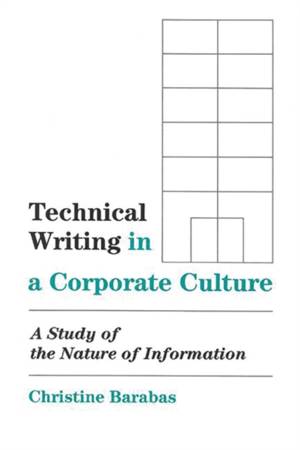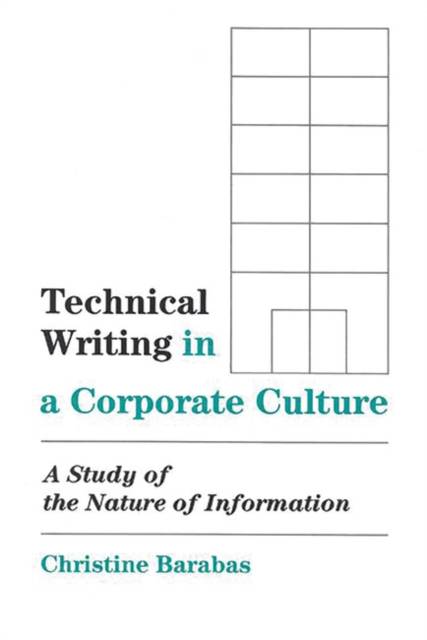
Je cadeautjes zeker op tijd in huis hebben voor de feestdagen? Kom langs in onze winkels en vind het perfecte geschenk!
- Afhalen na 1 uur in een winkel met voorraad
- Gratis thuislevering in België vanaf € 30
- Ruim aanbod met 7 miljoen producten
Je cadeautjes zeker op tijd in huis hebben voor de feestdagen? Kom langs in onze winkels en vind het perfecte geschenk!
- Afhalen na 1 uur in een winkel met voorraad
- Gratis thuislevering in België vanaf € 30
- Ruim aanbod met 7 miljoen producten
Zoeken
Technical Writing in a Corporate Culture
A Study of the Nature of Information
Christine Barabas, Kathryn Borman
€ 161,45
+ 322 punten
Omschrijving
With the growing interest in real-world (nonacademic) writing, critics are suggesting that the composition skills taught in schools may have little to do with the written communication skills students later need in their careers. There is a need for studies that examine writing in nonacademic contexts and that look at writing from a social perspective in order to examine the interrelationships among writing processes, texts, readers, and the functions writing serves within specific organizational settings. This volume is an attempt to increase our understanding of the nature of technical writing within an R&D organization by analyzing the three-match among writer intentions, texts, and reader expectations. Part One traces the interest in real-world writing and explores the differences between writing in an academic versus a real-world setting. Part Two provides a theoretical and conceptual background by discussing traditional and emerging models of technical communication, and by exploring different theories about the nature of science, technology, knowledge, information, language, and progress. Part Three describes the objectives, methodologies, findings, and conclusions of the study which investigated the match among the types of information that researchers (scientists and engineers) intend to include in their technical progress reports, the types of information actually contained in their reports, and the types of information that their supervisor readers expect in these reports.
Specificaties
Betrokkenen
- Auteur(s):
- Uitgeverij:
Inhoud
- Aantal bladzijden:
- 354
- Taal:
- Engels
- Reeks:
Eigenschappen
- Productcode (EAN):
- 9780893916039
- Verschijningsdatum:
- 1/01/1990
- Uitvoering:
- Hardcover
- Formaat:
- Genaaid
- Afmetingen:
- 156 mm x 234 mm
- Gewicht:
- 671 g

Alleen bij Standaard Boekhandel
+ 322 punten op je klantenkaart van Standaard Boekhandel
Beoordelingen
We publiceren alleen reviews die voldoen aan de voorwaarden voor reviews. Bekijk onze voorwaarden voor reviews.









